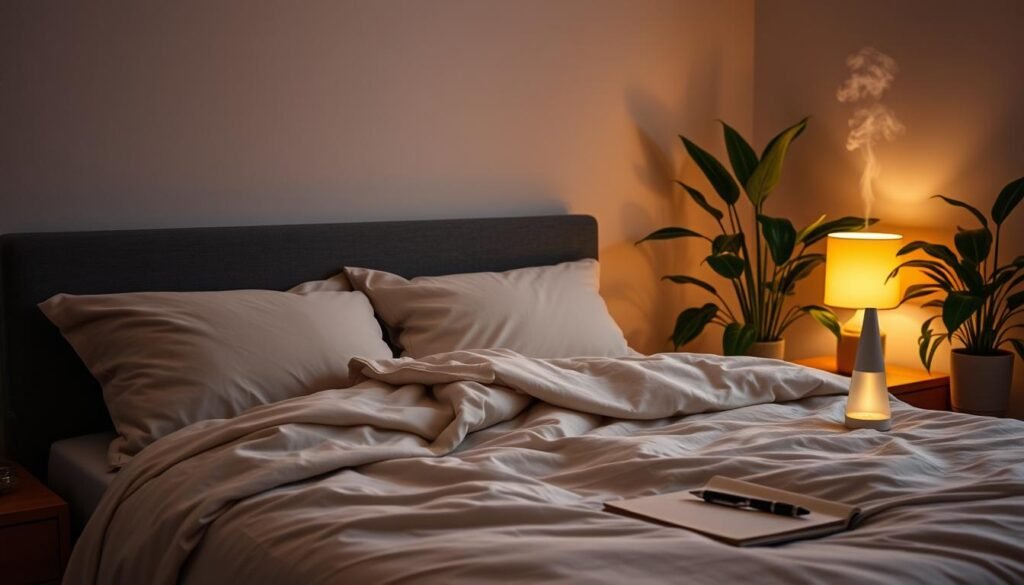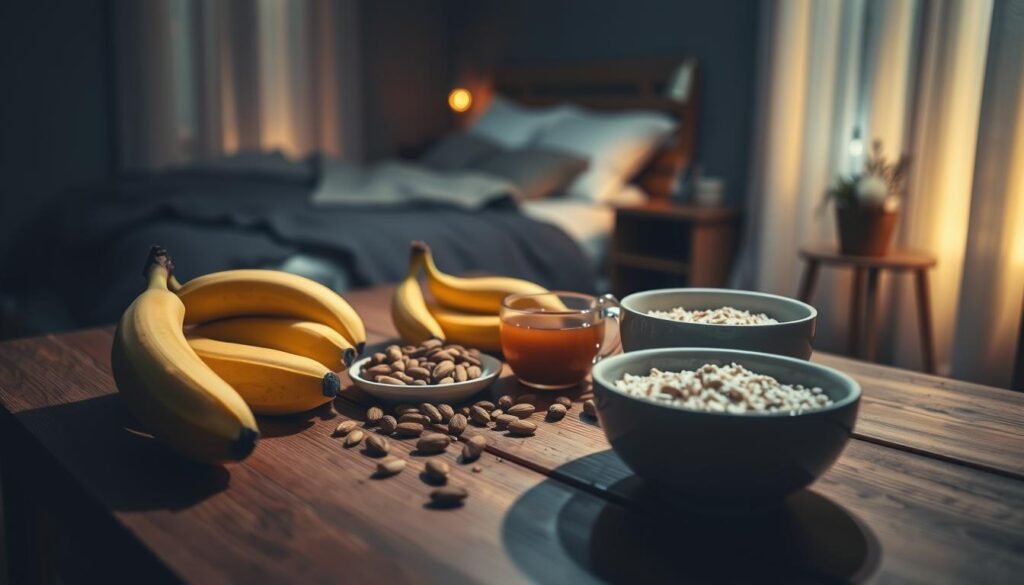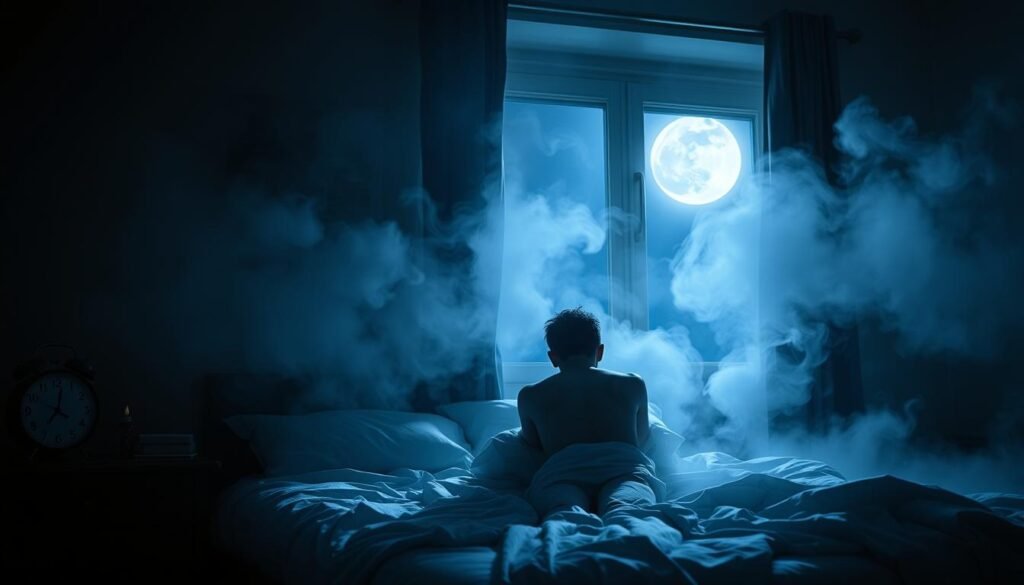Did you know that 44% to 71% of people with panic disorder have nocturnal panic attacks at least once? When night comes, the silence can make worries louder. These worries are often unnoticed during the day. This makes understanding nighttime anxiety important for managing it well. Anxiety at night can greatly disrupt sleep. This can hurt your well-being and quality of life. By using the right strategies, you can tackle nighttime panic. This will help you sleep better and reduce anxiety. This article will cover useful tips and ideas. These are meant to help you sleep well and feel more at ease at night.
Key Takeaways
- Approximately 44% to 71% of those with panic disorders experience nocturnal panic attacks.
- Distractions are minimal at night, heightening anxiety and the likelihood of panic attacks.
- Effective coping strategies can significantly enhance nighttime routines.
- A calming bedtime routine is reported to reduce panic attack frequency for over 70% of individuals.
- Research indicates that sleep deprivation worsens anxiety symptoms, creating a vicious cycle.
- Incorporating relaxation techniques can diminish the intensity of panic symptoms.
- Addressing anxiety at night is vital for improving overall health and daily functioning.
Understanding Nighttime Anxiety
Nighttime anxiety turns the peaceful night into a time of worry. Knowing why it happens helps us manage it better.
Common Triggers for Anxiety at Night
Many things can make us anxious at night. We might think too much about our day’s problems. Too much coffee, stress, or past scary experiences can make it worse. Studies show 24% to 36% of people with trouble sleeping also have anxiety.
The Biological Response to Nighttime Stress
When we’re anxious, our heart beats faster and we have more cortisol. This makes us too alert to relax. People with panic disorder are 3 times more likely to have sleep problems. Nighttime anxiety is both a mental and physical challenge that makes relaxing hard.
| Trigger | Impact on Nighttime Anxiety |
|---|---|
| Unresolved worries | Increases ruminative thoughts |
| Chronic stress | Heightens physical symptoms |
| Trauma | Intensifies emotional reactions |
| Lifestyle habits | Exacerbates anxiety levels |
| Panic disorder | Increases likelihood of sleep issues |
Knowing what triggers anxiety at night and the body’s response is key. With this knowledge, we can find ways to deal with it.
Why Do You Experience Anxiety at Night?
Anxiety at night comes from many daily factors. Stress during the day can change how we feel at night. Our minds go over the day’s events, worries, and things we didn’t do. This can make us feel more anxious as night comes. It can also mess up how well we sleep, so it’s important to understand why this happens.
Daytime Stress and Its Effects
People stressed in the daytime often find it hard to unwind at night. The day’s stress can turn into racing thoughts at night, making unresolved problems seem bigger. This is even tougher for those with anxiety disorders. Research shows that this stress makes sleeping hard, mainly for those who easily get stressed. Also, not sleeping well can make your body produce more noradrenaline, which might make you wake up feeling anxious. Knowing what makes you anxious during the day can help handle these feelings at night.
The Impact of Free-Floating Thoughts
When it gets dark, we may start to have more free-floating thoughts. These thoughts can make feelings of unease and worry worse. One might keep thinking about personal issues or what the future holds. For those who have trouble sleeping, this can make night anxiety worse. Not sleeping enough can also make anxiety symptoms more intense. Writing in a journal about your thoughts or what you need to do the next day can help calm your mind. This could lead to a better night’s sleep.
Symptoms of Anxiety at Night
Knowing how to spot anxiety symptoms at night is key. Nighttime anxiety shows up through different signs. Some are physical and others are mental. Spotting these can help you measure your anxiety. It can also guide you toward getting help or finding ways to deal with it.
Physical Symptoms to Recognize
You might notice several physical signs when anxious at night. These signs can be worrying. They include:
- Rapid heartbeat
- Shortness of breath
- Trembling or shaking
- Sweating or chills
- Lightheadedness
- A sense of impending doom
These symptoms can lead to panic attacks at night. These attacks can wake you up suddenly and only last a little while. Even though they’re short, calming down and sleeping again can be tough.
Mental Symptoms and Their Implications
Nighttime anxiety’s mental symptoms greatly affect one’s life. Some common mental signs are:
- Persistent worries that prevent relaxation
- An inability to concentrate or focus
- Recurring thoughts that heighten anxiety
The impact of mental symptoms is deep, hitting both night rest and daytime activity. Night anxiety can mess with your sleep schedule. This leads to feeling irritable, having trouble concentrating, and mood swings during the day. Understanding these signs helps in taking steps to manage your mental health better.
| Type of Symptoms | Examples |
|---|---|
| Physical Symptoms | Rapid heartbeat, sweating, trembling, shortness of breath |
| Mental Symptoms | Persistent worries, inability to concentrate, recurring anxious thoughts |
Importance of a Relaxation Routine
Having a steady relaxation routine helps ease anxiety, especially at night. It tells your body it’s time to relax, preparing you for sleep. Doing activities without technology helps clear your mind and balance your emotions. These activities help create a peaceful environment that’s good for winding down.
How a Routine Can Alleviate Anxiety
A relaxation routine can make a big difference in mental health. It can lessen anxiety symptoms and make you feel better overall. Relaxation methods can improve sleep quality by 30%, making it easier to fall asleep. Progressive muscle relaxation, done often, can reduce anxiety by 39% in eight weeks. This leads to less stress hormones and a calmer mind. Having a relaxation routine helps you deal with stress better.
Tech-Free Evening Activities
Choosing activities without screens can improve your relaxation routine. Reading, writing in a journal, or taking a warm bath helps tell your body it’s time to rest. Adding calming things like herbal tea or soft background noises makes the experience even better. These relaxing habits reduce anxiety and help you sleep better at night, improving your sleep quality.

Coping Strategies for Managing Anxiety at Night
Dealing with anxiety at night can be tough. There are many ways to help take control, though. Using effective methods can make it easier to relax and get ready for sleep.
Breathing Techniques that Help
Breathing exercises are easy ways to lessen anxiety. The 4-7-8 technique is very helpful. You breathe in for four counts, hold for seven, then exhale for eight. This helps calm your mind and body, making it easier to manage stress.
Progressive Muscle Relaxation
Progressive muscle relaxation is also key. It’s about tensing, then relaxing muscles from your toes up to your head. It helps your body relax, which in turn, eases your mind. This method is great for unwinding at night and improving sleep.
Nutrition for Better Sleep and Anxiety Relief
Nutrition plays a big part in improving sleep and easing anxiety. The right foods help you relax and feel calm. It’s important to choose what to eat wisely. Knowing how calming foods affect your sleep and anxiety is key. This knowledge helps you make good diet choices for better sleep.
Foods that Promote Calmness
Adding certain foods to your diet helps with sleep and anxiety. Here are some good choices:
- Chamomile tea: It’s known for its relaxing effects. Drinking chamomile regularly can help reduce anxiety.
- Atlantic salmon: Full of omega-3s, it’s linked to lower anxiety in men compared to other meats.
- Tart cherries: They naturally have melatonin, helping you sleep better and feel happier.
- Probiotic yogurt: This has good bacteria that may improve your stress levels and life quality.
- Dark chocolate: Studies suggest that cocoa can boost your mood and lessen anxiety.
- Nuts: Almonds and other nuts are tied to better mental health and less anxiety.
Hydration and Caffeine Awareness
Staying hydrated is key to feeling well, especially for anxiety and sleep. Being careful with caffeine is also crucial for sleep:
- Drinking caffeine too late can make it hard to sleep. Avoid caffeine six hours before bed.
- Drinking water all day helps reduce anxiety symptoms. Dehydration can affect your mood.
- Skipping late-night snacks, especially those that are sugary or fatty, helps your sleep quality.
Choosing the right nutrition for sleep and eating wisely fights nighttime anxiety. A diet with calming foods and limiting caffeine can lead to better sleep. This improves your overall mental health.

Nighttime Anxiety Tips for Better Sleep
Making your sleeping area calm is key to fighting nighttime anxiety. A sleep-conducive environment greatly improves sleep quality. Small changes in your room can make it a peaceful place before bed. This reduces anxiety and helps you relax.
Creating a Sleep-Conducive Environment
Here are some tips for a better sleep setting:
- Control lighting: Dim the lights an hour before bedtime to signal your body that it’s time to wind down.
- Manage noise: Use white noise machines or earplugs to block out disruptive sounds.
- Maintain comfort: Keep your bedroom cool, ideally between 60-67°F, as this temperature range is conducive to better sleep.
- Limit screen time: Reduce exposure to screens at least one hour before bed to avoid blue light’s impact on melatonin production.
- Establish a routine: A consistent sleep routine helps regulate the body’s circadian rhythm, making it easier to fall asleep.
Following these tips for better sleep will help create a calming space. It reduces anxiety and leads to more restful nights.
Mindfulness Meditation Before Bed
Trying mindfulness meditation before bed reduces anxiety. Adding meditation to your nightly routine calms your mind and prepares it for sleep. Here’s a simple way to start:
- Find a quiet space where you won’t be disturbed.
- Sit or lie down comfortably, closing your eyes to eliminate visual distractions.
- Focus on your breath, inhaling deeply through the nose and exhaling through the mouth.
- Allow thoughts to come and go without judgment, returning attention to your breath when distractions arise.
- Start with five minutes and slowly increase the time as you get comfortable.
Doing mindfulness meditation regularly helps in reducing anxiety. It makes for peaceful nights and boosts overall mental health.
| Environment Feature | Impact on Sleep |
|---|---|
| Lighting | Prepares the mind for sleep, enhances melatonin production. |
| Noise Control | Limits disturbances, helps maintain uninterrupted sleep. |
| Room Temperature | Aids in falling asleep faster and staying asleep longer. |
| Screen Time Management | Minimizes negative effects of blue light, enhancing sleep quality. |
| Consistent Sleep Routine | Regulates sleep patterns, making it easier to fall asleep. |
When Anxiety Keeps You Awake
Feeling anxious can make it hard to sleep, affecting your day. To fight this, try journaling and relaxation apps. These methods help ease anxiety and clear your mind for better sleep.
Journaling as a Tool for Release
Journaling helps you deal with thoughts and worries that keep you up. Spend a few minutes each night writing down your feelings and what stresses you. This clears your mind, making you more relaxed.
It can be a nightly habit that tells your brain it’s time to relax.
Using Mobile Apps for Relaxation
Adding relaxation apps to your bedtime routine can improve your sleep. Apps like Calm and Headspace have meditations, breathing exercises, and sounds to ease anxiety. They create a peaceful space, helping you feel calm before sleep.

Seeking Professional Help
Managing anxiety often goes beyond what we can do on our own. Professional help offers personalized solutions for those battling anxiety disorders. Mental health experts can unlock treatments that truly work. This includes cognitive behavioral therapy and medicines specifically for anxiety.
Knowing when to seek help is key to better life quality.
Cognitive Behavioral Therapy for Anxiety
Cognitive behavioral therapy (CBT) is a top method for dealing with anxiety. It changes negative thoughts and actions that feed anxiety. Studies suggest CBT aids 50-75% of patients, showcasing its effectiveness for chronic anxiety sufferers.
CBT usually involves weekly sessions of about 50 minutes. This helps people learn how to cope over time.
When to Consider Medication
Medication can sometimes be necessary, especially for severe anxiety. It can seriously disrupt daily life. Medicines like SSRIs are helpful for 60-80% of people, particularly when paired with therapy.
It’s important to talk to a healthcare provider to get a plan that fits one’s needs and preferences. They consider how severe the symptoms are and what the individual prefers.
| Professional Help Type | Effectiveness Rate | Frequency of Sessions |
|---|---|---|
| Cognitive Behavioral Therapy (CBT) | 50-75% success | Weekly for 50 mins |
| SSRIs | 60-80% effectiveness | As prescribed |
| Group Therapy | 30-50% reduction in symptoms | Varies |
Seeking professional help for anxiety can change lives. It opens doors to recovery and better emotional health. Knowing what help is available lets people make smart choices for their mental health journey.
Managing Anxiety with Lifestyle Changes
Making changes to your lifestyle can help control anxiety. Focus on exercising regularly and sleeping well. Moving your body boosts your mood and fights stress hormones causing anxiety. Good sleep practices also improve your mental health. They ensure you get the deep sleep needed to lower anxiety at night.
The Role of Regular Exercise
Being active is a strong way to manage anxiety. Studies show that people who exercise regularly are 60% less likely to feel anxious. Exercise decreases stress hormones like cortisol and boosts endorphins, making you feel happier. Enjoyable activities like walking, swimming, or yoga greatly benefit your mental health.
Sleep Hygiene Practices
Good sleep habits are essential for less anxiety at night. Aiming for 7 hours of sleep or more lets your body recover. A relaxing nighttime routine, such as reading or stretching, prepares you for sleep. Stay away from caffeine and alcohol because they can disturb your sleep and worsen anxiety. Small changes in how you live can greatly help with anxiety.
| Lifestyle Change | Impact on Anxiety |
|---|---|
| Regular Exercise | Reduces stress hormones, improves mood |
| Consistent Sleep Schedule | Enhances sleep quality, reduces emotional dysregulation |
| Caffeine Reduction | Decreases anxiety triggers, promotes calmness |
| Alcohol Reduction | Improves anxiety symptoms, enhances sleep |
| Mindfulness Practices | Relieves anxiety symptoms effectively |
Conclusion
Managing anxiety at night helps improve sleep quality and your overall health. It’s important to know the triggers and symptoms of nighttime anxiety. This knowledge lets you take steps to better your situation. Anxiety disorders are common in people with insomnia, highlighting the need for effective relief strategies.
Relaxation routines and mindfulness practices can help ease nighttime anxiety. Establishing a consistent bedtime routine is useful. It’s also good to understand how stress affects your body. If needed, getting help from professionals is key. They can create a plan that’s right for your needs.
Adopting a well-rounded approach that includes healthy lifestyle choices can boost your ability to manage anxiety. By using these strategies, you’re not just dealing with nighttime anxiety. You’re also improving your resilience against stress in the future.